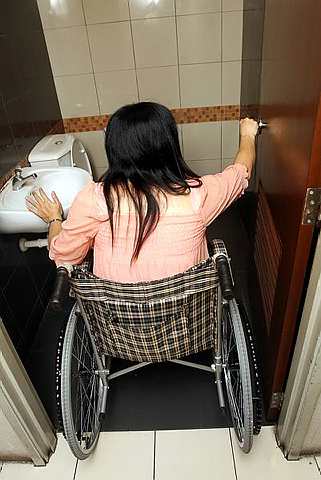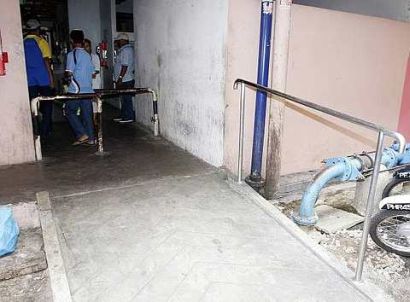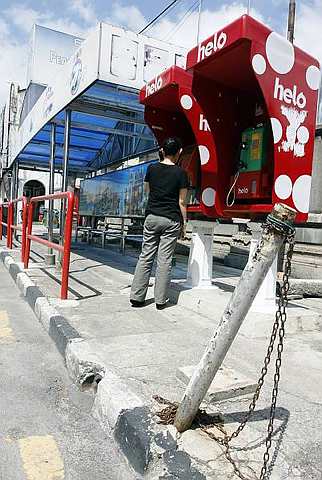The Star Online
News
Home > News > NationWednesday May 6, 2009
‘Do more for the disabled’KUALA LUMPUR: The Government should not be exempted from the provisions of the Persons with Disabilities Act 2008.
“The Federal Government is exempted from any wrongdoing, and this casts serious doubt on its commitment to the rights of the disabled,’’ Ragunath Kesavan, president of the Malaysian Bar, noted.
The Act, which came into force on July 7 last year, also lacked penalties for any party failing to comply with its obligations.
Ragunath said that although the Government had signed the United Nations Convention on the Rights of Persons with Disabilities last year, it had yet to ratify it.
“We strongly urge the Government to immediately ratify the convention and take measures to implement its obligations,’’ he said in a press statement yesterday.
Ragunath said disabled people faced unacceptable barriers in their daily lives due to the lack of proper infrastructure for them.
The shortcomings clearly showed up when Karpal Singh fell from his wheelchair at the Kuantan High Court recently, he said.
Ragunath said existing laws to protect the rights of the disabled and to improve their quality of life were still lacking enforcement.
The Malaysian Bar urged the Government to ensure facilities for the disabled and to improve and enforce the existing laws pertaining to their rights.
Category: News
Buses for the disabled: The Star, Metro North – February 16, 2009
Monday February 16, 2009
Buses for the disabledALL the 200 new buses to be added to the Rapid Penang fleet would be disabled-friendly, Second Finance Minister Tan Sri Nor Mohamed Yakcop said.
He said the buses would be delivered by June, bringing the total number of buses owned by the company to 350.
He said the new buses would be fitted with a ramp each to enable wheelchair-bound passengers to board them.
Nor Mohamed added that Rapid Penang had also installed the Global Positioning System (GPS) on all its buses to monitor their movements.
Passengers trying out the Rapid Penang bus service in Pekan Darat.“The GPS is rented from a service provider.
“It will improve route frequency and enable the company to provide better service to commuters,” he told reporters in Butterworth yesterday after launching Rapid Penang’s new Butterworth – Pekan Darat route in Tasek Gelugor.
Nor Mohamed said the company hoped to break even in three years despite the losses it suffered since beginning operations in July 2007.
It is learnt that the company has recorded losses of about RM7mil.
Nor Mohamed said the company projected to serve 40,000 passengers daily when the new buses were put on the road.
“The current fleet of 150 is serving about 25,000 passengers daily,” he added.
He said more routes would be introduced, especially in rural areas on the Penang mainland, when the new buses begin ope-rations.
Rapid Penang is a subsidiary of RapidKL which is 100% owned by the Ministry of Finance Inc.
Nor Mohamed said the company was set up to improve public transportation in Penang and was not purely profit-driven.
“The responsibility of serving the people was on our minds when we introduced Rapid Penang,” he added.
Plight of the disabled: The Star, Metro North – February 14, 2009
Saturday February 14, 2009
Plight of the disabled
By LOOI SUE-CHERNTOILETS for the disabled are often too small or are locked.
These are some of the problems faced by the disabled at some places in Penang, said Society of Disabled Persons (Penang) former president Tan Kuan Aw.
Tan, who is wheelchair-bound, said there were also toilets for the disabled which had been turned into storerooms because the managements of buildings where these toilets are located think not many people use them.
He said there were specifications that must be complied with when facilities for the disabled are provided such as handrails for ramps.
But after studying the situation in Penang for a decade, Tan did not think the local authorities were serious when it came to ensuring that these specfications were adhered to.
“The setting up of a barrier-free facility like a toilet for people with disabilities just for the sake of it is a misunderstood concept. There are Sirim standards and requirements that need to be followed,” he said in an interview.
A check by The Star in public places around Penang proved Tan’s descriptions of several public toilets accurate.
One such toilet in a building along the Jelutong Expressway was so small that a disabled person in a wheelchair would find great difficulty to close the toilet door from the inside.
Tight space: A woman in wheelchair demonstrating how difficult it is to use the cramped toilet for disabled persons.The reason for this, apart from the size of the toilet, is that the toilet door opens the wrong way. It opens inward, instead of outward or sliding.
Another toilet for the disabled persons in a shopping mall is occasionally locked and those who want to use the facility must find the cleaner who has the key, as instructed by a sign stuck to the door.
As for ramps, Tan said some were built without handrails. But in the case of the ramp at the Taman Sri Pinang flats on River Road, it was crossbars that has become a barrier for the disabled.
Stumbling block: A ramp with handrails is provided at Taman Sri Pinang but disabled persons, especially those in wheelchairs, cannot proceed further with the locked crossbars blocking the building’s entrance.Although the ramp has handrails, it is not barrier-free as there are crossbars at the bottom to prevent motorcyclists from using the ramp.
Women’s Centre for Change (WCC) committee member Lim Kah Cheng, who is an ardent activist for people with special needs, said the bars could also be a hindrance during emergencies like fires.
She said ramps could be designed in a way that motorcyclists could not misuse them, adding that the Penang Municipal Council (MPPP) had agreed to look into the matter.
“Instead of a ramp, a winding path that motorcyclists will find difficult to manoeuvre their vehicles on can be considered. The council already has the design which is not costly to follow,” said Lim, who is also an MPPP councillor.
Her other complaints include the putting up of signboards, road signs, advertisement boards and other obstructing objects in the middle of pavements or walkways; and high pavements.
Lim said the trick would be to get things right the first time – constructing buildings and providing public facilities that were universal.
“If you build a ramp, build one that is for everybody. What is good for the disabled is good for everyone else,” she added.
Danger lurks: This bus stop at Jalan Dr Lim Chwee Leong is unsafe for disabled persons, especially for the visually impaired and those in wheelchairs.MPPP president Datuk Zainal Rahim Seman, when contacted, said the council would take serious note of the problems faced by the disabled with the existing facilites.
“Our officers will conduct checks on these facilities to see if they comply with the required standards. If developers do not comply with building requirements, we will not grant them the CFs,” he added.




